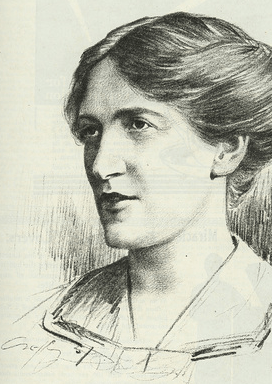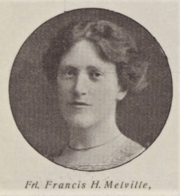Frances Melville facts for kids
Quick facts for kids
Frances Melville
|
|
|---|---|

artist unknown
|
|
| Born |
Frances Helen Melville
11 October 1873 Merchiston, Edinburgh, Scotland
|
| Died | 7 March 1962 (aged 88) Edinburgh, Scotland
|
| Resting place | Warriston Cemetery, Edinburgh, Scotland |
| Education | Philosophy Divinity |
| Alma mater | University of Edinburgh University of St Andrews |
| Known for | Women's rights Higher education Political activism |
Frances Helen Melville (born October 11, 1873 – died March 7, 1962) was a very important Scottish woman. She fought for women's right to vote and for women to get a good education. She was one of the first women to start studying at the University of Edinburgh in 1892. Later, she led the British Federation of University Women from 1935 to 1942.
Contents
Who Was Frances Melville?
Frances Melville was born in Merchiston, a part of Edinburgh, Scotland. Her father, Francis Suther Melville, worked in the legal system. Her mother was Helen Alexandrina Kerr. Frances was one of seven children, with five brothers and two sisters. She grew up in Edinburgh and went to George Watson's Ladies' College. She also spent a year studying music in Germany.
Breaking Barriers in Education
In 1889, a new law called the Universities (Scotland) Act changed things. It allowed women to earn degrees from universities in Scotland. Because of this, Frances Melville became one of the first women to enroll at the University of Edinburgh in 1892.
First Woman to Graduate
Frances studied hard and graduated five years later in 1897. She earned a top-level MA Honours degree in Philosophy. This meant she had a deep understanding of ideas and how people think. In 1910, she made history again. She earned a Bachelor of Divinity degree from the University of St Andrews. She was the first woman in Scotland to get this kind of degree, which is related to religious studies.
A Leader in Academia
After finishing her studies, Frances Melville worked as a teacher at the University of Edinburgh from 1896 to 1899. She taught subjects like logic and psychology.
From 1899 to 1909, she was the head of University Hall at the University of St Andrews. This meant she was in charge of a place where students lived. After that, she taught at Cheltenham Ladies' College for a short time.
Helping Women in Universities
In 1909, Frances became the head of Queen Margaret College at the University of Glasgow. This was a college specifically for women. She held this important job until the college closed in 1935.
Frances was the most senior woman academic in Scotland during her career. She was known for her great achievements in academics and her excellent leadership skills. In 1927, the University of Glasgow gave her a special award called an honorary LL.D. This was a big deal because she was the first woman academic to get such an award from the university. In 1935, she also received an OBE from the King, which is a special award for people who have done great things for their country.
Fighting for Women's Rights
Frances Melville spent her whole life campaigning for women's education. She believed that all women should have the chance to get a good education. She argued that it was wrong to make women choose between having a family life and having a professional career.
She was part of many groups that supported women. She helped start the Association of University Women. She was also the president of the Soroptimists Club from 1930 to 1931. From 1935 to 1942, she was the president of the British Federation of University Women. These groups worked to help women in many ways.
The Right to Vote
Frances was also a very active suffragist. This means she strongly believed that women should have the right to vote. She was a member of several groups that fought for this cause. These included the Edinburgh National Society for Women's Suffrage and the Scottish Universities Women's Suffrage Union.
In 1906, Frances and some other women, including Chrystal Macmillan and Elsie Inglis, took the universities of St Andrews and Edinburgh to court. They argued that because they were university graduates, they should be allowed to vote. The University of Edinburgh agreed that the women had graduated and were part of the university's general council. They had even voted in some meetings. However, the university still refused to let them vote in general elections.
Frances and her friends lost their case in 1907. They appealed to a higher court, the House of Lords, in 1908, but they lost again. Even though they didn't win this specific case, their actions helped bring attention to the fight for women's voting rights.
Running for Parliament
In 1937, after a politician named Ramsay MacDonald died, Frances Melville decided to run for election. She ran as an independent candidate in a special election for Scottish universities. This meant she didn't belong to a major political party. She came in second place, which was a very good result for an independent candidate.
During World War I, Frances helped train women for different jobs. During World War II, she was a driver for the Home Guard, helping out with the war effort.
Her Last Years and Legacy
After she retired, Frances Melville lived in Dalry before moving back to Edinburgh. She passed away on March 7, 1962, at her home in Edinburgh. She is buried in Warriston Cemetery in Edinburgh.
The University of Glasgow has honored Frances Melville by naming Melville House after her. The university also gives out the Frances Melville medal every year to the best student in Mental Philosophy. This shows how much her work and achievements are still remembered and valued.
 | DeHart Hubbard |
 | Wilma Rudolph |
 | Jesse Owens |
 | Jackie Joyner-Kersee |
 | Major Taylor |


